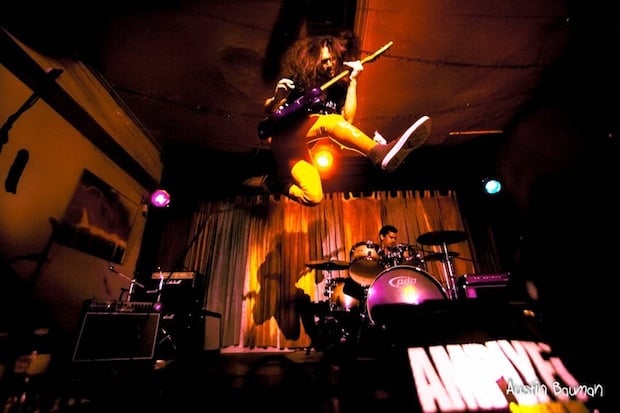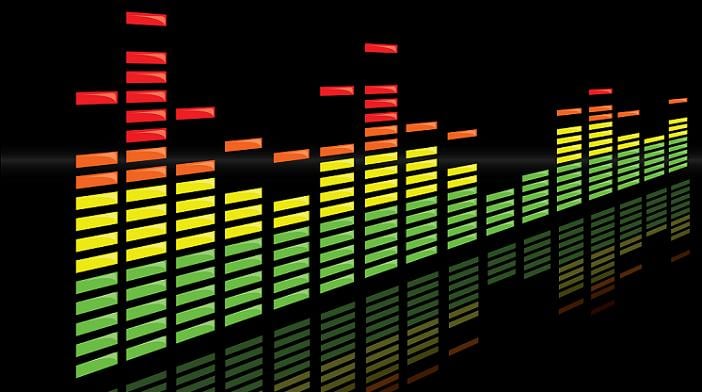 Photo by Austin Bauman via amplyfi.com
Photo by Austin Bauman via amplyfi.com
You’re looking to play in a new city and you find an awesome music venue… but there's no booze. What does that mean for your band? How do you get paid? Will your fans still come? Are there perks to playing an alcohol-free spot?
We got three expert talent buyers and venue owners from across the US to weigh in on the subject of booze-free music venues:
- Kota Wade is the 24-year-old owner and talent buyer for AMPLYFi. One of the few no-alcohol, all-ages music venues in LA, AMPLYFi is right next door to Paramount Studios in the heart of Hollywood and has hosted acts like Seal, Echosmith, and the Maine.
- Robert “Bob” Jensen is the owner and operator of Basement Transmissions (BT), an all-ages art and music space in Erie, PA. BT is proudly drug- and alcohol-free, boasting acts like Crown the Emperor, MUSHROOM HEAD, and Anti-Flag.
- Jackie Indrisano is the former talent buyer of the legendary RAT and the Red Room @ Café 939 in Boston, the latter of which has seen acts like Hozier, Tori Kelly, the Civil Wars, and more.
1. How do dry music venues make money?
Wade: At AMPLYFi, it's pretty straightforward: fans buy tickets to see bands they love.
Jensen: For BT, we have to find alternate ways to make money. If we were to rely specifically on the money from $5 and $10 local shows, we'd crash and burn.
When we first opened, we were in an almost plaza-like storefront and had to try and come up with rent every month. The bathrooms didn’t work and our landlord didn’t care. So we came up with the capital to purchase an old theater house. It’s much bigger, has better bathrooms, secondary stages, and a coffee shop.
Indrisano: The only way that a thriving revenue stream can happen is if a dry venue is on a college campus. The Red Room had a budget seed (supported by Berklee College of Music). For most dry venues, money will be made off of ticket sales when people want to come to the event so bad that they don’t care about the lack of booze.
2. Are band compensation structures different from traditional venues?
Wade: We don't have food and beverage, so bands are paid a split directly out of their ticket sales.
Jensen: Of course. The thing about an all-ages venue is that most bands playing are still amateur bands, with the exception of when we bring through national acts. BT is in Erie, so we’re right between Pittsburgh, Cleveland, and Buffalo. If someone comes through, we try to throw them gas money. If they’re totally amazing and bring in a huge crowd, we’ll throw them a little more than that.
Every once in a while, you’ll get a local band who are superstars – not only are they great musicians, but they’re extremely social young individuals, and they’re bringing 50 young kids to the venue. I’m going to throw them some money because I’m proud of them. I’m happy to give a cut to someone who’s working hard.
Indrisano: The compensation structure is going to be a door deal for most dry venues, not guarantees. In the beginning, the Red Room gave guarantees to establish the venue and to get noteworthy bands and the Boston music community to pay attention. By year three, it completely changed to door deals.
Why? When you’re dealing with emerging artists specifically, you’re helping bands develop. You’re taking mostly financial risks. You’re saying, “I believe in your band. I want to help you. I doubt you’re going to sell out this 200-cap room, but not because you’re not fabulous.”
[Is Your Band Ready to Demand a Guarantee for Shows? Venue Owners Explain the Reality]
3. What are some of the things that dry venues do to make ends meet?
Wade: We book the best bands with supportive fans. Also, AMPLYFi is frequently chosen to showcase bands for labels. The venue has also been featured in numerous photo shoots, indie films, music videos, as well as private events and buyouts.
Jensen: Dry venues have to be a lot savvier, and running one requires a lot more work. BT makes money by renting out 13 basement practice spaces as a solid source of income every month, which supplements revenue from shows. BT also rents the main hall to a church on Sunday mornings and rents to a recording studio in the upstairs space.
Indrisano: Having amazing food. Food plus ticket sales can make it happen. Or you have such a successful restaurant that the music is secondary, atmospheric. Rentals are the only other real revenue stream.
Thinking outside the box, people look for creative workspaces these days. You can let meetings happen in your venue, host company retreats, etc. You have to market your place as all-encompassing and have the staff to accommodate that. This is why a lot of dry venues don’t exist!
4. Do you think it's common for dry venues to take a cut of merch sales?
Wade: I can't speak for anyone else, but AMPLYFi doesn't take a cut of merch.
Jensen: Yes, but only on national acts. It’s not a very large cut. It can be up to 10 percent, but it’s usually not that high.
Indrisano: I think 100 percent artist sales should be the way everyone does business in small-capacity rooms. I understand that in bigger rooms taking a cut is always part of the deal. In rooms under 500 or even 1,000 – maybe even 5,000 – there’s no reason to do that. I don’t know the magic number, but I’ve never done it.
5. What makes a dry venue a great choice for a band?
Jensen: I feel like there needs to be a safe place for kids.
Indrisano: The glaring, most important thing is that the music or the art comes first. Today, we live in a society where people want to become clean and sober, and have decided that a drinking lifestyle doesn’t suit them anymore. Some people want to be there for the music or the artist.
6. At a dry venue, what might you offer bands beyond compensation?
Jensen: When bands come into town, sometimes you have to make them a dish! Or let them crash.
Indrisano: If you're dry, and you can afford it, the hospitality offered to bands and the public has to be 101 percent. You have to make sure that the green room is beautiful, clean, and comfy. You have to provide bottled water and towels. The sound and the lights have to be on point so your audience is transported – they've forgotten they don't have booze and are mesmerized by the artists.
8. Is it challenging for bands to play a dry venue?
Indrisano: It can be challenging because it’s a new way of thinking for many bands and music fans. As uncomfortable as people may be in a drinking environment, the same thing can hold true in a dry environment.
In my experience, some bands had never played in a venue that didn’t have alcohol and weren’t confident onstage if they couldn’t have a beer. Alcohol can be a comfort and a security blanket for artists and the public. Playing a dry venue can almost make you feel naked – it’s you and the music.
9. Are there perks to bands playing a dry venue?
Indrisano: I think it’s a nice addition to a Sonicbids EPK. You never know who’s looking and will say, “They aren’t afraid to play a dry venue,” and give you some fat guarantee.
10. What do you like best about running a dry venue?
Wade: People come mainly to enjoy the music, whereas, at other places, it can sometimes be all about the alcohol.
Jensen: My role is a positive force in the community. I was in a band throughout my whole life. Even though running the venue is more business oriented, I still get the opportunity to be creative on a regular basis, design flyers, etc. I also get to work with super positive, friendly, young artists that are doing super cool stuff, and you can’t really beat that.
Indrisano: The process of building trust with an artist, the manager, and the audience… and watching the artist win the room. If you’re booking a room at a small capacity, you have an obligation to grow emerging bands and give them 100 percent every time.
11. What's your best advice for running a dry venue?
Jensen: If you're looking to run a dry venue as your career, you're going to work three times as hard as someone who is running the typical alcohol-based spot. You can get into more trouble if your patrons or staff break the rules – you have to maintain control of your space.
Indrisano: You have to be super creative to run a dry venue. The artists and management have to understand and accept the “limitation” of a dry venue. Bands have to be truthful to themselves and to the talent buyer about their fanbase, because it all boils down to the honesty of the artist-fan relationship during live performances.
If no one shows up, bands cannot blame the venue, like they forgot the "no booze" part. It’s also important to hire staff and management that believe in the environment. There has to be an authentic allegiance to the cause.
Kaylee Bugg is a customer success specialist at Sonicbids. A graduate of Berklee College of Music, she is a vocalist, actress, band manager and former junior talent buyer for the Red Room @ Cafe 939.







